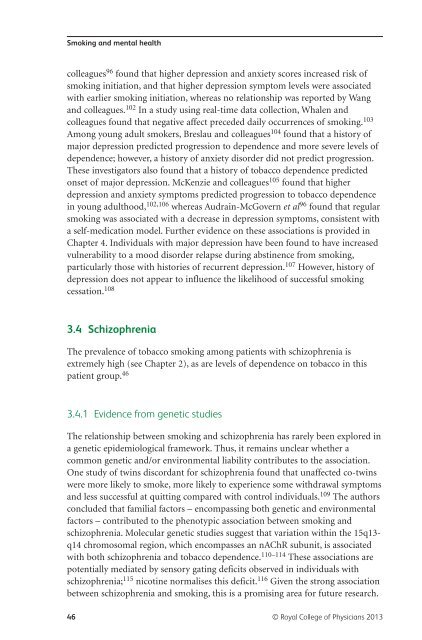Smoking and mental health - NCSCT
Smoking and mental health - NCSCT
Smoking and mental health - NCSCT
You also want an ePaper? Increase the reach of your titles
YUMPU automatically turns print PDFs into web optimized ePapers that Google loves.
<strong>Smoking</strong> <strong>and</strong> <strong>mental</strong> <strong>health</strong><br />
colleagues 96 found that higher depression <strong>and</strong> anxiety scores increased risk of<br />
smoking initiation, <strong>and</strong> that higher depression symptom levels were associated<br />
with earlier smoking initiation, whereas no relationship was reported by Wang<br />
<strong>and</strong> colleagues. 102 In a study using real-time data collection, Whalen <strong>and</strong><br />
colleagues found that negative affect preceded daily occurrences of smoking. 103<br />
Among young adult smokers, Breslau <strong>and</strong> colleagues 104 found that a history of<br />
major depression predicted progression to dependence <strong>and</strong> more severe levels of<br />
dependence; however, a history of anxiety disorder did not predict progression.<br />
These investigators also found that a history of tobacco dependence predicted<br />
onset of major depression. McKenzie <strong>and</strong> colleagues 105 found that higher<br />
depression <strong>and</strong> anxiety symptoms predicted progression to tobacco dependence<br />
in young adulthood, 102,106 whereas Audrain-McGovern et al 96 found that regular<br />
smoking was associated with a decrease in depression symptoms, consistent with<br />
a self-medication model. Further evidence on these associations is provided in<br />
Chapter 4. Individuals with major depression have been found to have increased<br />
vulnerability to a mood disorder relapse during abstinence from smoking,<br />
particularly those with histories of recurrent depression. 107 However, history of<br />
depression does not appear to influence the likelihood of successful smoking<br />
cessation. 108<br />
3.4 Schizophrenia<br />
The prevalence of tobacco smoking among patients with schizophrenia is<br />
extremely high (see Chapter 2), as are levels of dependence on tobacco in this<br />
patient group. 46<br />
3.4.1 Evidence from genetic studies<br />
The relationship between smoking <strong>and</strong> schizophrenia has rarely been explored in<br />
a genetic epidemiological framework. Thus, it remains unclear whether a<br />
common genetic <strong>and</strong>/or environ<strong>mental</strong> liability contributes to the association.<br />
One study of twins discordant for schizophrenia found that unaffected co-twins<br />
were more likely to smoke, more likely to experience some withdrawal symptoms<br />
<strong>and</strong> less successful at quitting compared with control individuals. 109 The authors<br />
concluded that familial factors – encompassing both genetic <strong>and</strong> environ<strong>mental</strong><br />
factors – contributed to the phenotypic association between smoking <strong>and</strong><br />
schizophrenia. Molecular genetic studies suggest that variation within the 15q13-<br />
q14 chromosomal region, which encompasses an nAChR subunit, is associated<br />
with both schizophrenia <strong>and</strong> tobacco dependence. 110–114 These associations are<br />
potentially mediated by sensory gating deficits observed in individuals with<br />
schizophrenia; 115 nicotine normalises this deficit. 116 Given the strong association<br />
between schizophrenia <strong>and</strong> smoking, this is a promising area for future research.<br />
46 © Royal College of Physicians 2013














